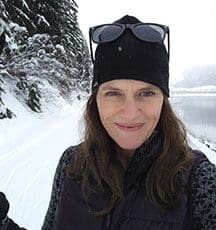When Dr. Molly Blackley Jackson was named Assistant Dean for Professionalism in October 2017, it was a new role for her but not a new topic of interest.
“As a resident, I was interested in professionalism,” she said. “I’m interested in ethical conundrums and shades of gray, and about how to be the best kind of physician one can be. It’s so hard to teach well. The best teaching of it can be done through role modeling and dialogue.”
Dr. Jackson’s first role model was her father, who was a family medicine physician in rural western North Carolina where she was born. She attended college and medical school at the University of North Carolina, Chapel Hill, and came to Seattle for her internal medicine residency in 2004.
During her residency, a research project on cynicism in medicine — conducted with Marj Wenrich, who is now associate dean for education strategies — was one of her first efforts to understand the challenges of a medical career. As a resident, she was appointed to the Continuous Professionalism Improvement Committee when it was formed in 2007, and she has been committee chair since 2014.
She joined the Division of General Internal Medicine in 2007 and continues to spend about 30 percent of her time in clinical care on the Medical Consult Service at UW Medical Center. She is also head of Cascade College, one of two colleges for medical students in Seattle, where she spends about half of her time. In this program, she teaches first- and second-year students clinical skills and professionalism as part of the Foundations of Clinical Medicine course, mentors students throughout medical school, and supports faculty development for College faculty members.
In her new role, Dr. Jackson will devote 20 percent of her time to developing a systematic approach to professionalism for UW Medicine. Going back to her early research, she sees even more risk of cynicism and burnout today as a result of the changing healthcare landscape. To lessen this risk, one of her goals is to create additional resources for faculty and leaders in the UW Medicine community to support professional development and personal wellness, including education and coaching.
What is professionalism?
Dr. Jackson also wants to promote an open dialogue about what professionalism means to diverse members of the UW Medicine community.
She points out that medicine has traditionally been a hierarchical field with power invested in high-ranking physicians and administrative leaders. Behaviors are expected to align with a set of values, as articulated, for example, in UW Medicine’s Policy on Professional Conduct. “The truth is that there are some fundamental values, fundamental behaviors that we expect … [and] that are necessary for keeping our patients safe,” Dr. Jackson said.
While having these values — and even a certain amount of hierarchy — helps to provide excellent patient care, the downside is that it is hard for those with less power to challenge those in authority for inappropriate or culturally biased behaviors. “Professionalism in medicine,” Dr. Jackson said, “can be seen as something that is primarily punitive. We have to be really clear and careful, and recognize that the word means different things to different people. We also have to keep revisiting our goals — to take excellent care of patients and to improve the health of the public — and understand that to do that well, we have to take care of each other.”
A starting point for dialogue
Dr. Jackson cites concerns about racism as one example of the need for dialogue. “Some of our students have felt that they have been silenced by leaders who say, ‘that’s not respectful language or respectful engagement.’ The perspective of some students is that, ‘I’m trying to stand up for what I believe in, which is doing right by patients and educating myself and my colleagues in a way that will lead to better health outcomes. I’m focused on justice, and is that not a professional value?’”
While she believes that it’s possible to be both truthful and respectful, she acknowledges that “it’s a challenge to get people’s attention in a way that moves things forward if you don’t have a little fire in you. That’s a reality that’s happening at our School right now. I think our job as leaders is to come alongside our students, listen to them, share our perspectives and wisdom —and recognize that what we define as professionalism will evolve for the better because of the work of our engaged student body.”
As she leads this evolution, Dr. Jackson offers her own definition of professionalism:
“I would like to see a culture where all of our interactions with each other — with our colleagues, with our learners and with our patients — are deeply respectful of the humanity in others. The historical values of the medical profession include excellence, integrity and compassion, but I think that respect is at the heart of it. To be at our best, we have to really see the other person in front of us, wonder about their journey, engage their perspectives, and collaborate.”
A personal journey too
 Dr. Jackson says that she was drawn to medicine originally by its combination of science and human relationships. She loves the outdoors and spends family time hiking and cross-country skiing with her husband, Dr. Benjamin Jackson, a pediatrician at Virginia Mason, and their two boys. She is also learning hydroponic gardening and gets together regularly with a group of UW Medicine physicians who paint with watercolors in the evenings at Magnuson Park.
Dr. Jackson says that she was drawn to medicine originally by its combination of science and human relationships. She loves the outdoors and spends family time hiking and cross-country skiing with her husband, Dr. Benjamin Jackson, a pediatrician at Virginia Mason, and their two boys. She is also learning hydroponic gardening and gets together regularly with a group of UW Medicine physicians who paint with watercolors in the evenings at Magnuson Park.


